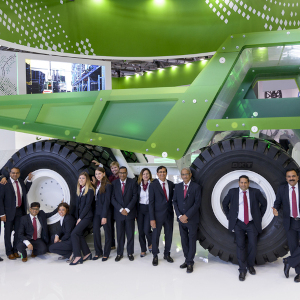Have you watched the latest episode of Global Trends yet? BKT honored World Earth Day by dedicating the sixth episode of Global Trends to the topic of climate change. Here, we discuss the innovative steps farmers are taking towards a greener future, and further ways we can all help fight the climate crisis.
Ready for World Earth Day? Can you imagine a more important day for farmers? At BKT, we honored the day by dedicating the sixth episode of Global Trends to the topic of climate change.
A range of international experts joined the newest episode to talk about climate change, which is perhaps the greatest challenge the agricultural sector, as well as to humanity, ever have faced. The Earth experiences increasingly extreme, frequent, and devastating climatic phenomena.
It is obvious that we all – including farmers – need to act. But what can farmers do? And what are we already doing in the agricultural sector?
Let’s work together!
The agricultural sector’s response to the climate emergency requires coordinated strategies at a global level. This comes with a challenge: Regulations and measures that are suitable for one country could be ineffective in another. How do we overcome this difficult issue?
John Reilly, economist in energy, environment and agriculture at the Massachusetts Institute of Technology (MIT), comments on the fact that there are some universal policies that help in this regard, such as incentives for farmers to implement sustainable and beneficial practices.
- Then there is also the question of animal agriculture and livestock that we know to be a consistent cause of methane emissions. How then? Changing ruminant diets can help reduce these emissions, but much can be done also focusing on soil. For example, it is essential to limit nitrogen fertilizers and use them more efficiently, thus reducing nitrogen oxide emissions into the atmosphere.
Responding to extreme weather
Prolonged summer droughts. Torrential rain. Hailstorms. Sounds familiar?
Farmers are especially vulnerable to the climate change. Extreme weather is one of the effects of climate change that impact agriculture the most.
In Italy, the effects of climate change on agriculture are tackled in a threefold way: the use of technology, the training of farmers, and the development of projects for the storage of rainwater.
- Thanks to the help of public funding, high-tech irrigation systems have been developed against drought in Italy, which allow to halve the use of water, as well as the installation of protective nets against hail, says Lisa Bellocchi, who is the President of the European Network of Agricultural Journalists.
The help of technology
New technology is essential to overcome the climate challenges. In the future, farmers will be increasingly more high-tech.
Francesco Cavazza is a researcher at the Italian research center “Acqua Campus”, which is a cutting-egde hub dedicated to the development and transfer of innovation to companies that operate in agriculture. He shares insights from a study on rainfall and its impact on agriculture. In one study they observed that rains have changed not so much in quantity but in frequency, becoming more concentrated at certain times of the year and thus creating problems of drought in the summer months.
- We have observed that this phenomenon leads to problems of leaching of nitrates and phosphates in the soil. To overcome this problem, it is possible to intervene by improving the fertilization of crops, using for example organic fertilizers and fertigation to avoid the loss of nutrients and use good practices such as cover crops, explains Cavazza.
Zero emission from agriculture by 2050
Many countries have set zero emissions targets. The agricultural sector is vital for any country in order to reach these targets. Tom O’Dwyer is the Project Manager Signpost Program at Teagasc, the Irish authority for agriculture and food development, and he shares updates from Ireland.
He explains that 37% of the total national greenhouse gas emissions in Ireland is generated by agriculture. For this reason, the Irish government – through the Climate Action Plan – is committed to zero emissions from agricultural operations by 2050.
- The Signpost Program goes precisely in this direction. This is a program that aims to reduce greenhouse gas emissions in the Irish agricultural sector, providing direct support to farmers and professionals in the agricultural industry through training and support for the adoption and sustainable technologies and good practices, says O’Dwyer about the program that he argues will be instrumental in achieving the zero emissions target that Ireland has set for itself.
Want to know more about how farmers and the agricultural sector can respond to climate change? Watch the sixth episode of Global Trends here!






